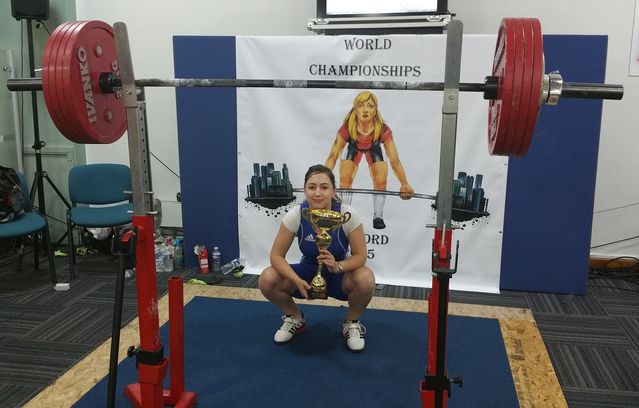Sport and Competition
Twelve Hours a World Champion, One More Lesson Learnt
Competitive powerlifting and the funny things we do for amateur sport.
Posted March 1, 2016
Last week was a funny week. I was left at the end of it feeling: I haven’t been very good to my body.
Powerlifting has an important place in my life. I wrote some years ago about how much learning to lift mattered to me as I came to know my body after anorexia, and more recently I had the chance to talk about its significance a bit more in a video the Oxford University Powerlifting Club women made last year. I’ve also loved learning more about lifting and about the human mind and body by training with and teaching other people. But as I’ve also discussed before, the principle of balance is often a pretty good one to live by in the aftermath of serious illness, and with anorexia perhaps even more than most.
Back in the summer of 2012, I wrote that ‘In everything food-related, the former anorexic has to be on guard against fanaticism’. But time passes, and illness grows distant enough that you no longer have to be on your guard, because you're just not attracted to the fanatical any more, and because the mechanisms that sustain equilibrium in you are well-oiled enough for it all to be automatic. Yet sometimes, something that matters a lot to you can start to compromise that, by crowding out other things.
It’s inevitable that the more seriously you take any single activity, the more pressure it’s likely to put on a life led according to the basic principle of balance. With sport, you only have to look at the obvious pragmatic factors – the time that training takes up, the way it discourages ‘interruptions’ like travel, the focus it entails on specific physical qualities, the way it informs diet – to see that there may be lots of ways in which achievement requires sacrifices to physical and psychological equilibrium.
Of course balance itself is a complex concept, and for some people the benefits (to mood or confidence or focus or physical strength or speed or whatever else) may be strong enough to compensate for the restrictions training imposes on one’s life and oneself. (Though I suppose my instinct is usually to wonder whether, if your mood or confidence or focus really needs improving significantly through sport, or strength or speed matters that much to you, something else isn’t getting neglected somewhere.) But it’s important to recognise that these bargains are being struck; only then can we decide whether they’re worth it.
Lifting competitively has been an interesting learning curve. I first competed (and won!) in 2013 (at regional and then national level – here’s a video of my best lift at the nationals). I set new personal records, and found it exciting, and liked meeting all the other lifters, who were uniformly friendly. My positive experiences of competing cemented the place lifting had in my life, making it something exhilarating as well as fulfilling.
The pre-comp weigh-in was only a small speck on my mental horizon; my then mentor advised I just have a glass of wine and no water the night before to lose a bit of water weight, arrive as early as possible to have the maximum time to eat and drink after weighing in, and otherwise not really think about it. So I didn’t, and it was fine. From the outset, though, the whole set-up also felt a bit weird, because the format (three attempts at each of the three lifts: squat, bench press, and deadlift) entails a lot of waiting around punctuated by very brief moments of extreme effort – really just an intensified yet drawn-out version of ordinary training, but with the nerves making it, for me, as much a draining process as an exhilarating one. From the beginning, too, eating right was something of a challenge: the first time I made the mistake of bringing nothing with me except sugary stuff, meaning that after about an hour I felt overstimulated and jittery and later crashed a bit, and the second time I did a bit better (chipolatas and cheese as well as chocolate etc.), but keeping the right energy levels up over a whole day was still tricky. I suppose for some people it’s all part of the fun, but not really for me. In general, the rather odd and specific requirement – to engage in intermittent very high-intensity exercise over a period of many hours – is still not something I feel I’ve mastered. Nor, if I’m completely honest, have I ever entirely enjoyed trying to master it.
Then just before Christmas 2013 I injured my lower back and didn’t compete the following spring. Last year, having added yoga and a lot more stretching to my routines, I felt strong and resilient and was keen to have another go. The qualifier was at the beginning of February, and the national meet at the end of the month, and I did well enough in the latter to qualify for the worlds (with the World Drug-Free Powerlifting Federation) in the summer. Although I had done all three lifts (squat, bench press, and deadlift) in the national competition, technically it was a ‘single lifts’ meet, meaning you can choose to do just one or two, and your scores for each are calculated individually rather than by aggregate. So, given that I’ve always been much better at the squat than deadlift or bench, and since three whole days of competition seemed a bit much, I decided that for the internationals I’d just focus on squat.

Then I went on a wonderful trip to the States – my first since I’d accompanied my parents on a coast-to-coast roadtrip aged one-and-a-half, happily whiling away the days in a luxurious cardboard box in the back of the hire car (and getting very excited about Disneyland). I gave a talk at Purdue and my partner and I spent some time in Chicago before and after, and Chicago felt like one of the only big cities I’ve ever been to that I could really love living a while in, snow-covered and flanked by the vast sparkling blue of the great lake. Then we were straight off to Germany for another conference, and France for skiing. For whatever reasons, I lost a few kilos during our time away – probably a good bit of muscle as well as some fat. This brought me down to right near the boundary of the weight class below the one I’d qualified in. And this in turn made moving into the next class down seem a viable option in a way it hadn’t before, though it became clear over the coming weeks that when training normally, my weight was naturally a bit above that boundary line.
By the week of the competition I’d managed to regain the strength I’d lost while away (and a bit more), and regained some of the lost weight (but not all), and asked the Oxford powerliting club President for advice about dehydrating to lose the extra kilo or so temporarily. He suggested a four-day programme of overhydration followed by underhydration. I really dislike drinking lots of water, so wasn’t thrilled at the idea of the first bit, but I gave it a go. It seemed to go OK, and I felt properly thirsty by the evening before the meet, but (contrary to the guidelines) kept eating normal solid food – chicken nuggets and chips, I think, in the Ramada Inn in the unglamorous Midlands town of Telford the night before the competition. (Lifting does take you some funny places.) I’d packed my scales – which brought back some anorexic memories, but mainly with the ironic humour of a victory quietly evidenced: I take them with me for fun reasons now. The morning of the meet, I felt fine, and enjoyed a swim and a few minutes in the sauna, and everything seemed to be in order.
Then it was time to go and weigh in. This is always a bit odd: a date with a female official and the weighing scales in your underwear. This time, being a bigger competition, it was a date with a female official and 30 or 40 other women, all in a snaking queue round the room with a range of undergarment skimpinesses. Some looked self-conscious, others didn’t, and amongst those who didn’t, with some you suspected bravado while some just clearly didn’t care. Lots of people, including me, were obviously a bit fascinated by the sheer range of bodies and attitudes on display, and of course trying not to look fascinated. I weighed in at a pretty perfect 300g under the boundary, and rushed off to start eating and drinking. The lifting went well – I set a new PB of 117.5 kg, which put me top in my weight class – and after collecting my big gold trophy we had a fun evening at a Mongolian barbecue place where you make your own combinations of meat, vegetables, spices, and sauces and watch it being cooked on a giant hotplate.

The next morning we went back to pick up my certificate before driving back to Oxford, and were told that someone had pointed out to the officials that because I’d qualified earlier that year in a different weight class, my placing was invalid and I’d have to be moved up to the higher weight class – where I came nearer the middle than the top. They didn’t take back my trophy – it still sits on top of the stereo towering happily over all the others – and in fact they still gave me my winner’s certificate, but my 12-hour stint as undeserving world champion was over.
I was annoyed about it – annoyed that I’d been disqualified only the day after, annoyed that I hadn’t bothered to read the small print in the rule book, annoyed that one of the other competitors had brought this up, annoyed that the officials hadn’t said anything at the weigh-in or later, and puzzled by the rules, which seemed an unnecessary discrimination against people whose weight happens to fluctuate naturally somewhere near the bottom of a weight category. I also resolved to do things differently next year.
Now it is next year, and I’ve been so busy with work that I only remembered to register for a regional qualifier just in time. My weight was a steady 2 kg or so above the boundary, but I assumed that the dehydration thing would work fine again, especially if I switched to mainly liquid meals for the final day, which I hadn’t bothered with before. So the week began with a million fruit teas and reluctant glasses of water, and it was a relief when I could start to cut back on them again a couple of days out.
I weighed myself every morning last week. This felt strange in itself. Typically I weigh myself every few weeks, somewhat haphazardly and without much interest, mainly as a way of tracking whether anything changes in the correlation between bodyweight and lifting performance. Within a normal 2 kg variance, nothing much ever changes, so it’s neither very interesting nor in any sense emotionally invested, except insofar as it’s quite nice registering this general stability in numerical form now and then. I suppose since last year’s competitions I’ve been aware of that weight class boundary as a reference point, but nothing more than that.
Now, though, the scales had suddenly become meaningful in an immediate and strongly valenced way: that is, I unequivocally wanted them to register less. They didn’t. My weight stayed almost comically stable all week. I started to resent this. I was doing everything right; why was there no weight loss? The morning of the qualifier came, and it was still exactly the same. I had a small very strong cup of tea and went to the loo and had a hot bath, and it went up 200g. I was kind of incredulous, kind of disappointed, kind of cross, and a tiny bit laughing at myself. On the drive there I ate a sausage and an energy gel, and I weighed in at 2.3kg over what I’d hoped. Also, it turned out that the event was being run very much as a functional qualifier: if you can lift your qualifying weight on your first attempt, you don’t get to do any more. So there wasn’t even the opportunity to use it as good psychological and physical prep for a real competition.
I felt annoyed again, and a little bleak that all this hassle had ended me up exactly back where I’d been last year. But this time, I mainly felt annoyed at myself for being annoyed with myself. This feeling crystallised that evening and the next morning. This week, I hadn’t been good to my body. I had forced my body to take on too much fluid, and then I’d deprived it of adequate fluids. I’d been cross with my body for managing, despite it all, to maintain stubbornly healthy fluid levels. I’d resented weighing an arbitrary amount more than an already arbitrary amount. I’d resented having my period that week, thinking that might have been responsible for some of the fluid retention. I’d wanted my body to be other than what it is – nicely stable and reliably healthy – and had let myself be frustrated at its refusal to be.
I didn’t feel good about any of this. Conversely, the things I did feel good about were precisely the things that during the week I’d felt slightly bad about doing: going out for two dinners with colleagues earlier in the week, because that’s when they happened to be, and eating and drinking normally at them; and on the Friday night, making dinner for a friend who was in the country only briefly, and eating and drinking normally with her too. I met some really interesting people on those evenings, and cemented a meaningful relationship, and enjoyed the food and the wine, and had fun. Of course, there might have been other chances to do those things, and if I were ‘really dedicated’ to this sport, maybe I’d have said no to all three. Maybe then I’d have made the weight; quite probably not. I’ll never know.
I have learned an important lesson about me and sport, though. Mainly, I’ve learned that amateur sport is terribly easy to take way too seriously, and that, for now, I choose not to. I won’t be competing this year, in any weight category. For me now, the appreciation of having a resolutely stable bodyweight that I needn’t worry about, a body that is strong and capable and well fed and not over- or underwatered, is poignantly present. I feel almost ashamed of my behaviour, because it shows so little gratitude for what is really a wonderful way to be. If your body is happy as it is, don’t mess with that.
I suppose in a way it’s a marker of my confidence in being way past anorexia that I did all this in the first place, without worrying that it would do any lasting damage to my mental equilibrium. I suppose it’s good to know you can mess around with your diet and your body and the scales and then bounce back with relief to normal life afterwards. But for now I’d also rather not. It’s been great to leave the scales untouched again, great to eat and drink with unsullied relish, great to go back to sociable evening training after all the competition-tailored morning sessions, great above all to reach a new acceptance and pleasure in this body the way it is.

This is perhaps an unforgivably long-winded way of saying, quite simply: this February, I’ve had my priorities straightened out.




